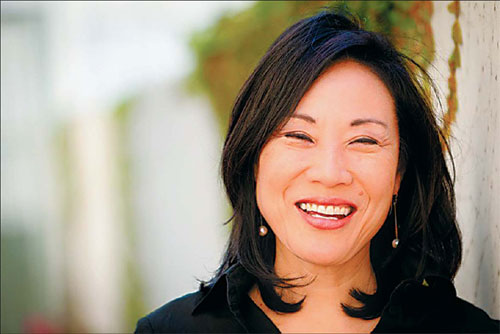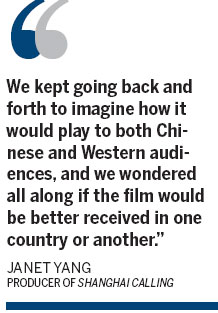A love letter to Shanghai
Updated: 2012-08-10 09:50
By Raymond Zhou (China Daily)
|
|||||||||||
 |
|
Chinese-American filmmaker Janet Yang has worked on a few cross-cultural movies over the past few decades. Photos provided to China Daily |

If Midnight in Paris is Woody Allen's love letter to the French capital, Shanghai Calling can be seen as Janet Yang's love letter to the "Oriental Pearl on the Huangpu River".
The first film Janet Yang was involved in was also set in Shanghai. Empire of the Sun is about a bunch of British citizens living in the Chinese city and imprisoned by Japanese invaders during WWII. That was a Shanghai torn and scarred by the fires of war. The massive crowd scene as refugees fled Japanese soldiers is a picture of horror and suffering.
Yang was working at Universal Studios selling American movies to China when Spielberg's team approached her. She considers that experience of working with the master an "incredible privilege".
Yang's involvement with China went back further. Before she entered Hollywood, she had worked a year at Beijing's Foreign Language Press, and then ran a company in San Francisco to distribute Chinese films.
From 1989 to 1996, Yang formed a company with Oliver Stone and produced The People vs. Larry Flynt and executive-produced The Joy Luck Club, adapted from Amy Tan's bestselling novel and starring an all-Asian cast. The latter experience taught her that "you can provide an authentic glimpse into a different culture, and if the characters and situations are fundamentally relatable, you can also achieve universal appeal".

However, The Joy Luck Club is quintessentially Chinese-American, not purely Chinese. As such, it did not get much initial attention in China "as it did not seem to shed any new light for Chinese", but its Stateside success eventually spilled over to China.
Another cross-cultural film Yang produced was Dark Matter, starring Meryl Streep and Liu Ye, which tells the sad story of a Chinese student whose failure to adapt to American college life resulted in a rampage of violence and death.
When the accomplished Chinese-American producer was hired to spin off Disney's highly coveted High School Musical franchise into a Chinese remake, it sounded like a great idea.
However, this made-in-China-and-for-China version bombed spectacularly. Some who saw it even thought it was an unauthorized knockoff.
Signs of a dud appeared even before the film opened, as Huayi Brothers "handed the film back to Disney to market". The musical has the glossy look of a svelte mannequin but lacks the chemistry so crucial for this genre to click with its target audience.
"Perhaps the film would not have done well in any case. We'll never know," Yang reminisces. "I personally really like the songs, both the melodies and lyrics."
Shanghai Calling is definitely harder to pull off. It is a comedy that straddles two cultures. After Yang signed on as producer, she sat down with Daniel Hsia, the writer-director, to fine-tune the script.
"We kept going back and forth to imagine how it would play to both Chinese and Western audiences, and we wondered all along if the film would be better received in one country or another," she says in an interview with China Daily.
Yang's acute bicultural sensibility helped ensure that China in the movie be not seen from an outsider's point of view. Cheap shots such as Sam encountering a squat toilet in his posh apartment were removed because "we would lose significant credibility with the Chinese audience".
If pre-screenings like the one at the Shanghai International Film Festival are any indication, Yang and her team have much to laugh about.
"We've found audiences on both sides of the Pacific laugh uproariously, albeit sometimes at different parts." The fundamental reason is, "the characters are uniformly likable" and the story "is extremely refreshing and unique".
While waiting for Shanghai Calling to premiere around the world, Yang reveals her ultimate dream for her filmmaking career: a movie that is "incredibly smart, entertaining, and that can change people's view of China and Asians in general through deeply resonant portrayals", a movie that would "wow" people.
"It doesn't matter what the genre is," she adds.
Contact the writer at raymondzhou@chinadaily.com.cn.
Related Stories
Poll: Chinese want lower movie-ticket prices 2012-08-07 10:31
ASIWYFA in Shanghai 2012-08-03 13:18
Hunan charmer in Shanghai 2012-08-04 07:45
Warner Bros. postpones 'Gangster Squad' movie after shooting 2012-07-27 08:55
Hostage movie 2012-07-24 13:37
Today's Top News
President Xi confident in recovery from quake
H7N9 update: 104 cases, 21 deaths
Telecom workers restore links
Coal mine blast kills 18 in Jilin
Intl scholarship puts China on the map
More bird flu patients discharged
Gold loses sheen, but still a safe bet
US 'turns blind eye to human rights'
Hot Topics
Lunar probe , China growth forecasts, Emission rules get tougher, China seen through 'colored lens', International board,
Editor's Picks

|

|

|

|

|

|









